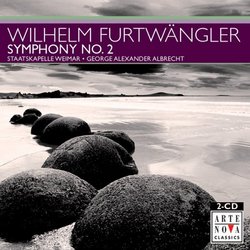| All Artists: Wilhelm Furtwangler, George Alexander Albrecht, Weimar Staatskapelle Title: Wilhelm Furtwängler: Symphony No. 2 Members Wishing: 0 Total Copies: 0 Label: Arte Nova Classics Release Date: 3/22/2005 Genre: Classical Style: Symphonies Number of Discs: 2 SwapaCD Credits: 2 UPC: 723721077754 |
Search - Wilhelm Furtwangler, George Alexander Albrecht, Weimar Staatskapelle :: Wilhelm Furtwängler: Symphony No. 2
 | Wilhelm Furtwangler, George Alexander Albrecht, Weimar Staatskapelle Wilhelm Furtwängler: Symphony No. 2 Genre: Classical
|
Larger Image |
CD Details |
CD ReviewsHot-blooded excitement by the carload Mark Younghusband | SoCal | 07/25/2005 (5 out of 5 stars) "White-hot performance worthy of the Master himself. Volcanic climaxes, petal-to-the-floor surges with thundering, crashing tympani (just like Furtwangler himself), and a direct, personal involvement with the music that -- again -- recalls the Maestro. This is the performance that reveals this symphony as the masterwork it is. Albrecht holds everything together convincingly, and forges a blazing sense of unity out of the 81 minutes of the symphony. My only quibbles regard the Andante: Albrecht is a little too casual with the great simple melody that opens the slow movement, so that the tune itself gets treated almost as a throw-away line. Sometimes A. is strangely neglectful of these simple little lines of melody, and fails to set them off as they should be. And sometimes I wished he had relaxed a bit more in the slower passages. But these are very minor considerations. This recording is electrifying, powerful, even overwhelming. It's been a long time since I've heard a performance on CD with this much force and passion and immediacy. (It must be said that the orchestra is often less than ideally virtuosic, especially in the last movement, but I found I was so carried away by the band's emotional commitment that I cared very little about technical proficiency.) Highly recommended." The best Performance of Furtwängler's Great Symphony Jeffery A. Triggs | New Jersey | 10/11/2008 (5 out of 5 stars) "I suspect the jury is still out on whether or not Wilhelm Furtwängler can be considered a great composer, but he wrote at least one great symphony, the 2nd. It is a mature, brooding work, massive in scale, and fully realized. Furtwängler fretted so much and so long over his 1st that it has a relatively tentative feel. Indeed, at least one theme from that work, which he never felt ready to be published, seems to be given more polished treatment in the 2nd, composed in a relatively brief period at the close of the 2nd World War. The 3rd, on the other hand, gropes forward marked by the pain of his final years and perhaps never quite finished. In this symphony, at the height of his creative powers, he got it right as in no other work with the possible exception of the piano concerto. The 2nd symphony requires quite a few hearings to sink in properly, but it richly rewards those prepared to make the effort to come to grips with it. The first movement is a great, sonata form drama, contrasting harsh dissonances with nobly elegiac themes. The second movement is a tender slow movement that could come right out of the gentler music of Brahms. The third is a spookily effective scherzo. The fourth is a grand summation and resolution of the drama with which the symphony begins. Listeners will of course begin by picking out similarities to more familiar works - e.g., Bruckner, Brahms. (I also hear bits of Beethoven - an allusion to the 5th symphony in the 1st movement- Tchaikovsky and Mahler at times.) Eventually these "echos" fade away as the true Furtwängler compositional sound becomes more familiar. I like to think of this work as Furtwängler's elegy for the German Romantic movement, to which he had devoted his professional life and which he saw crumbling around him as he composed the symphony. In this respect it is not unlike Strauss's contemporary works, the Metamorphosen and Four Last Songs. The scale here is more massive of course - and dangerously extravagant in terms of the feelings it exposes and what it trusts to the expanded symphonic form. One thinks here of the Mahler of the Resurrection Symphony, particularly in the vast, affirmative summing up of the final movement. A bad performance could sink the work in bathos. Fortunately Albrecht is up to the task of bringing this piece off. I confess that I started with this set and later purchased the Barenboim version with the Chicago Symphony, but I find I prefer Albrecht's reading, which is sharper in its attacks and maintains better control over the huge structure." Not a Bruckner Mahler imitation, and it grows on you D. Ramsey | New York, NY United States | 02/24/2006 (4 out of 5 stars) "Furtwangler's Symphony No. 2 is a rich score, and not what I'd expected, which was an attempt by the famous conductor to compose like Bruckner and Mahler. I did not think his music had their sound, and if I was reminded of anyone at certain moments in the score it was Elgar. But comparisons aside, this is music generally in the mold of the "twilight" romantics and 20th-century symphonists. It has breadth and beauty. It spans well more than an hour with soaring passages and melancholy brooding. My one reservation about this recording is that it represents a live performance, with coughing not removed (as it should be in this digital age), yet without any noting of this fact on the packaging."
|

 Track Listings (3) - Disc #1
Track Listings (3) - Disc #1